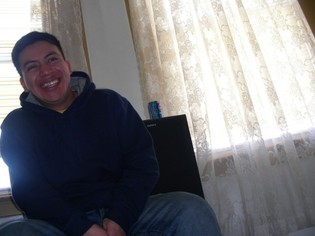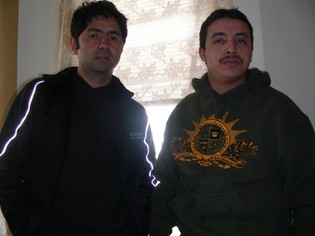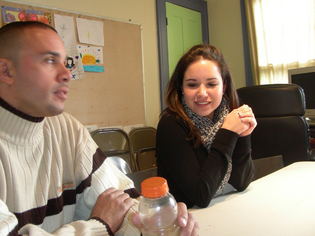 This man from Guatemala took a chance on a modern-day underground railroad — and landed safe and sound in Fair Haven.
This man from Guatemala took a chance on a modern-day underground railroad — and landed safe and sound in Fair Haven.
His name is Angel Mendoza. He and five other Guatemalan workers were living and working in northern Connecticut under what they called conditions of modern-day human captivity.
Thanks to the extraordinary rescue and resettlement efforts of an immigrant-friendly network in New Haven, they’re now living in the Fair Haven neighborhood, earning an honest wage and moving about freely. They put their lives in the hands of activists from Junta for Progressive Action and Unidad Latina en Acci√ɬ≥n (Latinos United in Action).
“They are our guardian angels,” Mendoza said Monday.
Those “angels” coordinated the Guatemalans’ journey here last May but waited until this week to talk about it, pending the filing of a federal lawsuit on the workers’ behalf.
“Tractor Washing” Fees
Mendoza (pictured above in his apartment Monday) is one of 12 Guatemalan workers in whose name the suit was field. They all came to the U.S. legally last spring to work in North Carolina. They obtained H2‑B temporary work visas for jobs, promised by recruiters, to cut pine trees. When they arrived, according to their complaint, a tough guy named “El Chino” put them in vans which transported them to Hartford. There, the complaint alleges, they were basically held prisoner and put to work under dangerous and illegal conditions in Granby at Imperial Nurseries (slogan: “Naturally Impressive”).
According to their legal complaint, “El Chino” and his associates
put them in a squalid and dangerous apartment;
seized their passports so they wouldn’t flee;
shut off their contact with the outside world;
told them authorities would send them home if they tried to ride a public bus;
paid them well below the minimum wage for some 80 hours a week at the Granby nursery;
barred them from medical help when they got injured (“You are here to work, not to be sick”);
made plantation-style deductions from their paychecks for housing, “tractor washing” and “tool cleaning”;
and threatened to inform immigration authorities and have them deported if they complained or tried to leave. The workers seek back wages and punitive damages.
Click here to read their lawsuit, which was filed by Yale law students associated with their school’s Human Trafficking Project.
In a statement released after the suit’s filing last week, the company said the feds had cleared the nursery of human trafficking allegations after an investigation last summer. The statement said the company fired a subcontractor after learning of “appall[ing]” underpayment of employees.
Click here to read the company’s statement in full.
Word Reaches Fair Haven
 The workers were fearful of speaking out. Finally, one of the workers, Marvin Coto, told their story to a woman at church in Hartford. She told the story to someone from a Hartford advocacy group called Latinos Contra La Guerra, who in turn contacted John Jairo Lugo (shown at left in photo alongside another of the plaintiffs, Walter Hernandez) in New Haven.
The workers were fearful of speaking out. Finally, one of the workers, Marvin Coto, told their story to a woman at church in Hartford. She told the story to someone from a Hartford advocacy group called Latinos Contra La Guerra, who in turn contacted John Jairo Lugo (shown at left in photo alongside another of the plaintiffs, Walter Hernandez) in New Haven.
Lugo, through a group called Unidad Latina en Acci√ɬ≥n, sticks up for immigrants — confronting exploitive landlords and employers, pushing politicians and the cops for more humane treatment.
Lugo’s group works on those issues alongside Junta for Progressive Action. He called Junta’s then-chief, Kica Matos, who assigned Sarahi Uribe, a Yale student working at the agency for the summer, to the case. Uribe spoke with the Guatemalans, sometimes for hours a day on the phone, to gain their trust and urge them to exercise their rights. The pair traveled to a Hartford coffee shop called La Paloma Sabanera to make the case for a rescue mission to Coto, who was living with five other of the workers. (Some of the others had already managed to flee.)
“We figured the best thing to do for them was to move them out of Hartford for their safety,” Lugo recalled. But that took convincing. The workers had to conclude, first of all, that these New Haven activists weren’t just another group of hustlers lying to them. Then they had to believe they could get away despite the alleged threats from their employers. They believed their apartment was constantly watched.
“I need to talk to the guys,” Coto told Lugo and Uribe. “They are afraid of what could happen to them.”
Finally he told Lugo and Uribe that, yes, they’d come with them to New Haven. Lugo and Uribe instructed them to pack all their belongings before going to work the next day. And not to say a word to their employers.
Meanwhile, the pair borrowed a pickup and a van. They pulled up to the Hartford apartment around 9 that night, threw all the workers’ bags into the vehicles, and sped away to the safety of Fair Haven.
Then Fair Haven’s informal immigrant-aid network kicked into gear.
 Junta had arranged with a sympathetic landlord, Angelo Reyes, to make a seven-bedroom apartment available to workers on Poplar Street. Reyes (pictured Monday with Junta’s Laura Huizar) agreed to let the workers stay for free for a few days; Junta scraped together money for the rest of the month from an emergency fund.
Junta had arranged with a sympathetic landlord, Angelo Reyes, to make a seven-bedroom apartment available to workers on Poplar Street. Reyes (pictured Monday with Junta’s Laura Huizar) agreed to let the workers stay for free for a few days; Junta scraped together money for the rest of the month from an emergency fund.
“There are a lot of unfair bosses out there. It bothered me” how the workers were treated, Reyes said. “The rent was irrelevant at that point.”
Reyes, who also owns two neighborhood laundries, picked up their clothes and washed them for free.
Lugo helped the guys find furniture and introduced them to people around town. He brought them to the supermarket. Matos invited them to a barbecue at her house. Two of the workers signed up for English as a Second Language classes at Junta, whose staffers took them on a tour of the city. They accompanied the workers to the summer concerts on the Green.
And, yes, they showed them how to use the city bus system.
The workers all found jobs, too. Mendoza and Hernandez, both of whom are 24, work at company in a nearby town. They said they’re happy there. They work eight hours a day, period.
On off hours, they occasionally hit clubs or go to parties. Mostly they hang out a lot at home, said Mendoza, who’s originally from the town of Chiquimula (and hopes to return there one day to reunite with his girlfriend and his family). Mendoza particularly enjoys renting DVDs. “I like the comedies — Eddie Murphy, Martin Lawrence,” he said.
He and Hernandez, who hails from Morales, both sent home photos of their friends from Junta and Unidad. On the photos they wrote, “Our guardian angels.”
“There are guardian angels everywhere,” John Lugo said. He found plenty of them when he came to the U.S. many years ago without permission and worked his way to legal citizenship. “Part of living in a community,” he said, “is you help other people.”